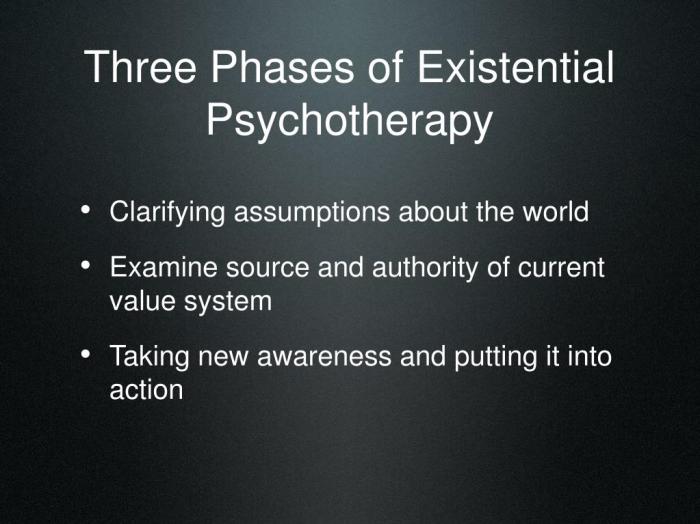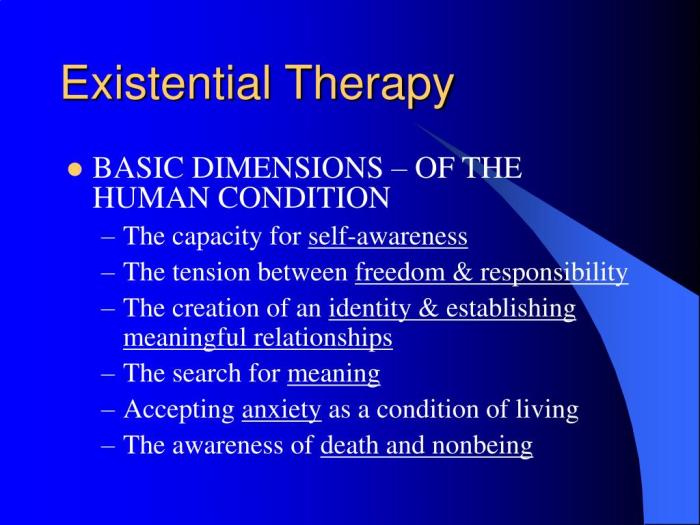The goals of existential therapy include all but – The goals of existential therapy encompass a comprehensive approach to understanding and addressing human existence, focusing on personal responsibility, freedom, and the search for meaning and purpose in life. Existential therapists guide clients in exploring their unique experiences, values, and beliefs, empowering them to navigate challenges and cultivate personal growth and well-being.
Existential therapy aims to foster self-awareness and self-acceptance, recognizing the inherent freedom and responsibility that individuals possess in shaping their lives. It delves into existential concerns such as mortality, freedom, and isolation, helping clients develop coping mechanisms for anxiety, depression, and other mental health concerns.
1. Understanding the Goals of Existential Therapy

Existential therapy is a form of psychotherapy that focuses on the existential concerns of human existence, such as meaning, freedom, responsibility, and death. The core principles of existential therapy include:
- Personal responsibility:Existential therapists believe that individuals are responsible for their own choices and actions, and that they have the power to create their own meaning in life.
- Freedom:Existential therapists emphasize the importance of freedom and choice, and they encourage clients to explore their own unique paths in life.
- Meaning:Existential therapists help clients to find meaning and purpose in their lives, even in the face of adversity.
Existential therapists approach client issues by helping them to explore their own values, beliefs, and experiences. They encourage clients to confront their fears and anxieties, and to take responsibility for their own lives.
2. Exploring the Goals of Existential Therapy

Fostering Self-Awareness and Self-Acceptance
Existential therapy aims to foster self-awareness and self-acceptance in clients. Therapists help clients to identify their strengths and weaknesses, and to develop a more realistic and compassionate understanding of themselves.
Finding Meaning and Purpose in Life, The goals of existential therapy include all but
Existential therapy also helps clients to find meaning and purpose in their lives. Therapists encourage clients to explore their values and beliefs, and to identify what is truly important to them. This can help clients to develop a sense of direction and purpose, and to live more fulfilling lives.
Navigating Anxiety and Depression
Existential therapy can be helpful for clients who are struggling with anxiety and depression. Therapists help clients to understand the existential roots of their anxiety and depression, and to develop coping mechanisms that can help them to manage these conditions.
3. Addressing Common Misconceptions about Existential Therapy

There are a number of common misconceptions about the goals of existential therapy. Some people believe that existential therapy is about promoting nihilism or despair. However, this is not true.
Existential therapy is not about denying the existence of meaning or purpose in life. Rather, it is about helping clients to find their own unique meaning and purpose. Existential therapy can also be helpful for clients who are struggling with anxiety and depression.
Therapists help clients to understand the existential roots of their anxiety and depression, and to develop coping mechanisms that can help them to manage these conditions.
User Queries: The Goals Of Existential Therapy Include All But
What is the primary focus of existential therapy?
Existential therapy focuses on helping individuals understand their unique existence, embrace personal responsibility, and find meaning and purpose in life.
How does existential therapy address anxiety and depression?
Existential therapy provides coping mechanisms and insights into the existential concerns that may underlie anxiety and depression, empowering clients to navigate these challenges.
Is existential therapy nihilistic or pessimistic?
Contrary to misconceptions, existential therapy does not promote nihilism or despair. Instead, it encourages personal growth, well-being, and the discovery of meaning and purpose.